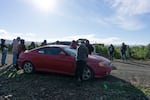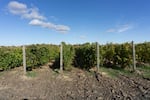On a chilly fall morning in southeast Washington, Itzel Cuevas Vásquez stood among rows and rows of grapes. The Blue Mountains lay in the distance.
Cuevas Vásquez doled out hot cups of coffee and cinnamon tea to roughly a dozen vineyard workers. Once they had steaming cups in their hands, they leaned against their cars and turned their attention to Cuevas Vásquez.
She briefly introduced herself, and then began telling the workers about a long list of services that could help them: a food bank, free dental and vision care, free vaccines.

Vineyard workers listen to a presentation from Vital Wines, a nonprofit winery that connects them to health care resources.
Susan Shain / NWPB
Many of Washington’s farm workers come from other countries, particularly Mexico. And when these workers have health concerns, they’re often not sure where to turn. The American health care system can be difficult to navigate for anyone.
That’s where Cuevas Vásquez comes in. As a “promotora de salud,” or health care advocate, she visits vineyards during the harvest season and connects workers to local programs and organizations.
“Sometimes the resources don’t get to the employees out in the vineyards,” she said. “I find it very rewarding that I am able to go out to them and not necessarily wait for them to come to me.”
Cuevas Vásquez moved from Mexico to Walla Walla as a child. She spent time picking onions, apples and grapes, so she knows how exhausting it can be.
“We always focused on the work and getting things done, and meeting everybody’s basic needs, which was food and shelter,” she said. “We would always put health last.”
Cuevas Vásquez is one of three promotoras in the area: Two are in Walla Walla and one is in the Tri-Cities.

Yvonne Segovia, left, who works for the Blue Mountain Action Council’s food bank, and Itzel Cuevas Vásquez, a “promotora de salud” for Vital Wines, pose before giving a presentation to vineyard workers.
Susan Shain / NWPB
These positions were developed by Vital Wines, a nonprofit winery in Walla Walla, and are funded by partnerships between Vital and local health care organizations. Cuevas Vásquez, for example, is an employee of both Vital and the Blue Mountain Action Council.
Promotoras “work as bridges between community members and the clinics that already exist and are being underutilized,” said Ashley Trout, who founded Vital in 2016.
Trout was raised in a bilingual household and remembers helping her surrogate grandmother at doctor’s appointments. “As a kid, you want to get those moments right,” Trout said. “But it’s medical jargon. And you’re 7 (years old). So that really stuck with me.”
The winery relies on donations of everything from grapes and corks to wine bottles, graphic design, warehousing and trucking.
Even Trout, who is a winemaker, works for free. She recently hired a part-time winemaker to help, and she frequently partners with guest winemakers as well.
“The collaboration wines are really, really fun,” Trout said. “These boutique lots are crafted with care from winemakers in the valley who understand how important it is to do what we’re doing at Vital.”

Rows of grapes outside of Walla Walla.
Susan Shain / NWPB
Since 2017, Vital has earned $1.2 million from wine sold through its tasting room, wine club and events. It uses this revenue, along with grants and donations, to fund its programs.
Those include free eye exams and eyeglasses for vineyard workers and their families, an emergency assistance fund that has covered 654 days of sick pay for vineyard workers, and the promotora de salud program.
Trout eventually hopes to place promotoras in all of the state’s wine regions. Washington’s wine country brought in over $1 billion from tourism in 2022, according to the National Association of American Wineries.
“You just can’t have that thriving industry resting on the backs of people whose basic needs aren’t being met,” Trout said. “That won’t work, not in the short term and not in the long term.”
That said, health care is complicated. And Vital faces many challenges. Most vineyard crews only work a few months of the year, and not all crew bosses or winery owners want workers taking breaks to learn about health care. Some workers are undocumented and may be wary of newcomers.

A vineyard worker’s car with the Blue Mountains in the background.
Susan Shain / NWPB
Ramón Esparza, a crew boss and member of Vital’s board, has been working in the wine industry for two decades. In the past, he said that many of his crew members didn’t go to clinics because they couldn’t afford the visits or weren’t sure what the process was. But Vital’s visits have allowed more workers to take charge of their health.
“It’s good because we need them,” Esparza said. “They’re the hard workers. They pick up the harvest. They do everything. It’s almost 90% in the vineyard and maybe 2% or 5% in the winery.”
On the day that Cuevas Vásquez visited, many members of Esparza’s crew seemed interested in Vital’s offerings. One man said he’d schedule a doctor’s appointment. Another planned to sign up for free food drops from a local nonprofit.
Neither man had known how to access these services before. They said that navigating life in a different language and a different country has been tough — and that any help is, well, vital.
This story comes to you from the Northwest News Network, a collaboration between public media organizations in Oregon and Washington.
This republished story is part of OPB’s broader effort to ensure that everyone in our region has access to quality journalism that informs, entertains and enriches their lives. To learn more, visit our journalism partnerships page.